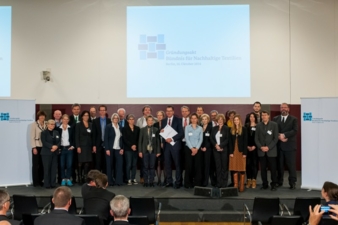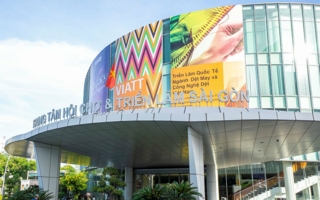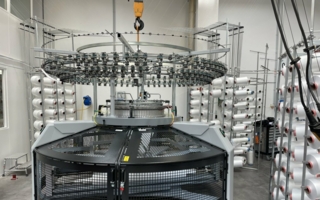26/01/2015 — auf Deutsch lesen
Not if, but how
The Alliance for Sustainable Textiles is causing concern among the industry – and not only in Germany. Their action plan is not feasible for many companies. However, the alliance is still not off the table. Textile network has done research and made enquiries. What is the status quo and, above all, where do things go from here?
The Alliance for Sustainable Textiles was formed on 16th October 2014. Since then, around 60 trade unions, associations, initiatives, NGOs and companies have joined the Textiles Alliance. The latter are primarily pioneers within the sustainable textiles and natural textiles scenes. The mainstream German textiles and clothing companies have so far still not joined. Although companies such as Tchibo, C&A and Otto – who have had corporate social responsibility (CSR) enshrined in their corporate strategies for many years – have been involved at the forefront, they do not yet see themselves in a position to sign the almost 50 page action plan.
Sustainability experts have praised the process through which the plan was created, and have evaluated the preliminary discussions as constructive. However, they believe that the action plan was finalised too quickly. “Imprecise”, “naïve” and “unrealistic” are the common criticisms. “German action alone is not enough,” the scope is too broad and the demands are too high – at least in the given timeframe until 2020. The rapid closing of ranks with NGOs has also been viewed critically by the industry, who do not feel that they have been included to a sufficient degree.
In a statement to the Textiles Alliance in October 2014, the Tchibo retail group expressed their criticisms as follows: “For an alliance that joins together the interests of government, non-governmental organisations, trade unions and business, concrete action plans and timeframes are absolutely necessary. This includes priorities and step-by-step plans as well as a realistic evaluation of feasibility and the financial consequences.” They added that, from a business perspective, it would also be irresponsible and careless to associate with a political declaration of intent whose feasibility cannot be assessed in any meaningful way due to its lack of precision, and which is open to arbitrary interpretation in its current form.
According to CSR experts from both industry and trade, it is currently not feasible for even highly committed companies to guarantee a living wage beyond their first stage suppliers (Tier 1). However, the action plan stipulates that a living wage should be paid all the way through to the cotton fields. For many companies, supply chain penetration is still a black box and making commitments bound by timeframes seems unfeasible. So far, the Textiles Alliance has no plans to introduce punitive measures for non-compliance, or even just measures to monitor or verify compliance. However, many companies consider it irresponsible to agree to guidelines that they most likely will be unable to adhere to within the given timeframe. According to the industry, this would be the case with certain chemicals that have been banned in the action plan for which there are currently no alternatives.
Against this backdrop, even Federal Minister of Economic Cooperation and Development Gerd Müller was unsuccessful in convincing major industry associations GermanFashion and The Textile + Fashion Confederation to join the alliance. “We were actively involved in every discussion from April to October. However, among other things, the action plan contains wide-ranging measures that our member companies are unable to implement.
For this reason, we see no possibility of joining the alliance. This applies to us as much as GermanFashion,” confirmed Dr. Hartmut Spiesecke from The Textile + Fashion Confederation. However, he added, this does not rule out potential membership in the future. Spiesecke admits: “The alliance’s aims are right. What is controversial, however, is who can implement what by when. A multi-stakeholder approach is also correct.” The industry associations are open to cooperation as well. “Now it is up to the Federal Ministry. We are ready for discussions,” said Spiesecke.
Retailers are also ready for talks. The HDE, AVE and BTW organisations, together with large retailers such as Adler Modemärkte, Aldi Nord, Aldi Süd, C&A, Edeka, Ernsting’s family, Kik, Lidl, the Metro Group, the Otto Group, the Rewe Group and Tchibo, have gone one step further and signed a declaration of intent in October 2014. In the declaration, the companies and associations state that they are prepared to “work towards creating a process for sustainable textiles in an active and implementations-oriented way.”
In this regard, the action plan from the Textiles Alliance serves as a preliminary framework for a sustainable textiles supply chain. In their declaration of intent, the companies and associations acknowledge the ‘hotspots’ named in the action plan as “relevant areas for action”. At the same time, they make clear that, in its current form, the plan is not suitable for making sufficient improvements for people working in developing countries. They add that it is vital to set realistic and feasible goals that are viable not only for individual companies, but for the majority of textiles retailers both domestically and abroad.
Since the signing of the declaration of intent, there have been discussions on all sides concerning which projects can be undertaken within which timeframes. “Like many other companies, the Otto Group issued a declaration of intent in conjunction with the major industry associations. We’re in agreement that the issues and aims raised by the alliance are right. We are now in the process of reaching a consensus at a company level on how we can work together with the Textiles Alliance to create suitable action plans for the broad realisation of these issues,” said Andreas Streubig, Division Manager of Corporate Responsibility at the Otto Group.
HDE Managing Director Kai Falk confirmed: “We’re in constant communication with the companies over the next steps. We’re also in dialogue with the NGOs and the Federal Ministry for Economic Cooperation and Development. Serious efforts are being made on all sides.” Falk continued: “We need a strategy and an action plan that also allow Germany’s small and medium-sized companies (SMEs) – that is to say, the wider business community and not just the major corporations – to follow down this path.”
The Dialog Textil-Bekleidung (DTB) industry association has already joined the Textiles Alliance. The International Association of the Natural Textile Industry (IVN) has joined as well. The DTB’s membership is particularly noteworthy as conventional textiles companies are part of that organisation. DTB Managing Director Susanne Paß said: “Since 1992, the DTB has been working on the issues of environmental and social standards within the textiles and apparel industry. Sustainability has always been a part of our day-to-day work. It made sense for us to join the Textiles Alliance.” She continued that only active participation in the alliance would allow for constructive collaboration in the alliance’s diverse working groups.
Furthermore, Susanne Paß made clear that: “By joining the alliance, we are only declaring that we are uniting to develop something together, and that we will use the available synergies and cooperate. Our common goal is to effect changes within the supply chain. The action plan is not set in stone. The Federal Ministry has continually emphasised that individual points are open to discussion and amendment.” She believes it was right that the alliance set high demands. “The action plan is visionary and has ambitious goals. It is the right thing to do. What does it achieve if we use the status quo as a basis? It does not bring the industry any closer to reaching its goals for the coming years.”
As far as an economic textiles alliance is concerned, there is no question of ‘if’. Ultimately, there is general agreement that an alliance is both sensible and worthwhile. There is, however, still a need for discussion on the question of 'how' regarding implementation.” Federal Minister Gerd Müller recognises this as well.
[Jana Kern]
Part 2 “The Rolls Royce of textiles“





